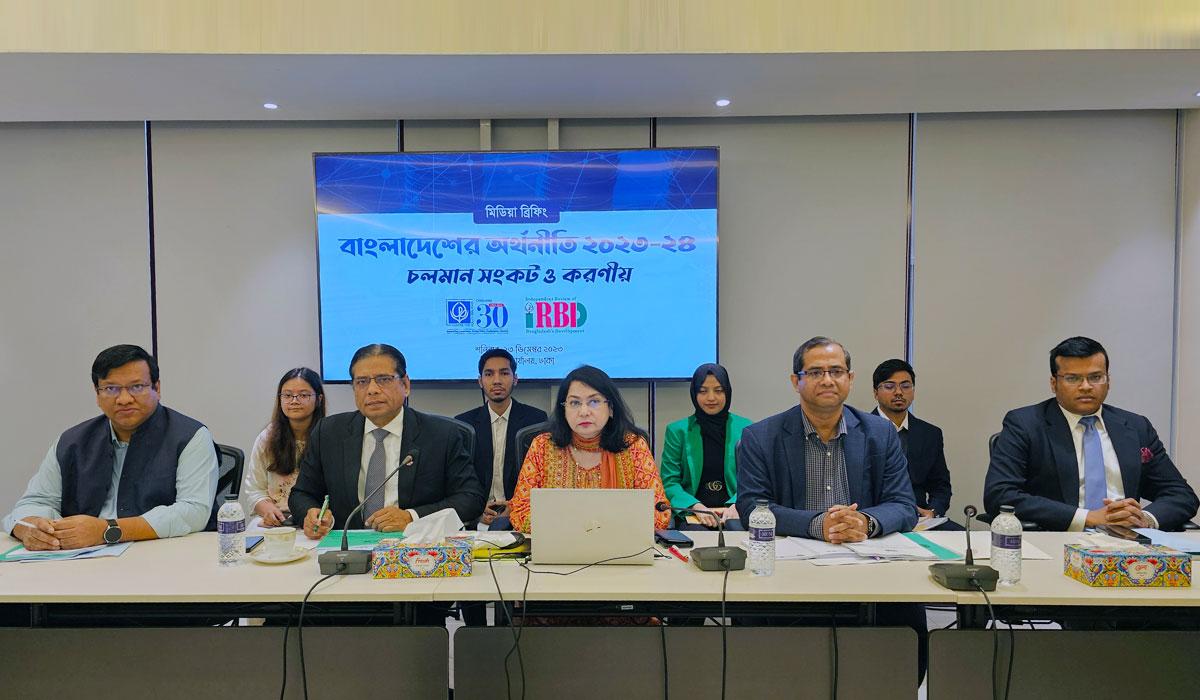
Download: Paper | Presentation
A staggering BDT 922.61 billion has been misappropriated from several banks over the last 15 years through irregularities, misuse of powers, and potential money laundering. The economy is grappling with crony capitalism, where influential individuals and groups have seized control by subduing state organs and institutions, consolidating power to their advantage. The astonishing amount of money embezzled through 24 major loan scams during the aforementioned period underscores the lack of good governance in and vulnerability of the financial sector. The prospects of recovering the misappropriated funds remain uncertain, with a looming possibility of them being illicitly transferred abroad.
The above-mentioned observations emerged at a media briefing titled ‘State of the Bangladesh Economy in FY2023-24 (First Reading)’ on Saturday, 23 December 2023, organised by the Centre for Policy Dialogue (CPD) under its flagship programme Independent Review of Bangladesh’s Development (IRBD). Dr Fahmida Khatun, Executive Director of CPD, gave her welcome remarks and delivered the keynote presentation.
In her keynote presentation, Dr Khatun said, ‘As Bangladesh approaches the year 2024, the persisting macroeconomic issues should remain as the key focus for the policymakers. The economy is going through unprecedented challenges, and these are not going to recede to the backfront even after the national elections, scheduled to be held on 7 January 2024’.
She underscored that the crucial task confronting the policymakers is to restore macroeconomic stability by acknowledging the current economic realities and identifying concrete measures to address these. In this context, five areas warrant increased attention in the ongoing policy discourse — high inflation; diminishing prospects for a stable banking sector; vulnerabilities in external sector; weak public finance management; and concerns regarding labour rights issues.
‘High inflation is currently eroding the purchasing power of low-income people, while market manipulation and syndication are exacerbating the situation’, said the Executive Director. In the case of banking sector, comprehensive reforms are needed that will strengthen commercial banks, empower the central bank, create a conducive legal environment, and ensure availability of data.
While discussing the vulnerabilities of the external sector, Dr Khatun said that the apparel exports are emphasising volume over value. To address this, incentives should be adjusted to encourage diversification within RMG, and promote the shift to non-cotton-based exports for cater to a growing market. The lack of accountability in public finance management has led to overpriced and wasteful public expenditure. Also, it is advisable to reconsider the revision of minimum wage in the garment industry by 2025.
‘The government will also have to focus on structural issues since better economic performance will critically hinge on the efficiency of some of the important institutions including the National Board of Revenue (NBR), and the Bangladesh Bank’ proposed Dr Khatun.
An open-floor Q&A session with journalists from both print and electronic media followed the presentation.
Professor Mustafizur Rahman, Distinguished Fellow, CPD addressed the inquiries and said ‘The country is approaching a two-economy paradigm, driven by a widening income distribution gap that is fostering inequality’.
‘At least 12 institutions, including the central bank, Bangladesh Securities and Exchange Commission (BSEC), Bangladesh Export Processing Zones Authority (BEPZA), and the Ministry of Commerce, have been enfeebled. Restoring their status and functionality after the election appears to be a formidable challenge’ suggested the Research Director of CPD, Dr Khondaker Golam Moazzem.
Mr Towfiqul Islam Khan, Senior Research Fellow, CPD, underscored ‘The government’s expenditure is relatively low when measured against the size of the economy and the essential needs of the people’.
The media briefing concluded with closing remarks from the Executive Director.

